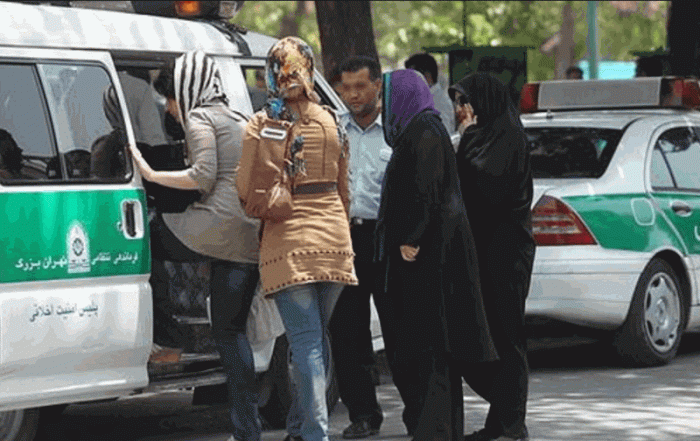
The repressive Iranian regime security forces arrest women for what they call mal-veiling
February marks the 40th anniversary of the Islamic Revolution, and the Iranian regime is using the occasion to celebrate the fact that it has managed to hold onto power: a lukewarm achievement at best.
Iranian women felt the sting of oppression under the mullahs’ rule immediately and have suffered daily for the last forty years. It is hard to understate how drastically life changed for women in Iran after 1979 and how deeply this has altered Iranian society.
Second-class Citizens
The regime’s misogynistic views toward women are documented well before the 1979 Revolution. In 1962, Ruhollah Khomeini previous regime Supreme Leader wrote a letter to the Shah of Iran, conferring his extremist views under the banner of Islam, saying that the “interests of the state are better served by preserving the religious teachings of Islam and calmness of the heart.” He advised that women should no longer be allowed to vote.
#Iranian women are fighting stronger than ever and paying the highest price in the struggle for #humanrights #justice #freedom #democracy #workersrights #childrights #environmental justice #womensrights #separationofchurchandstate & more! #FreeIran pic.twitter.com/2T6Y8lzg5T
— Women's Committee NCRI (@womenncri) February 13, 2019
After the Shah’s monarchical dictatorship was overthrown in the 1979 Revolution, Khomeini seized control of the country and established the clerical regime that is still in place in Iran. Shortly after the Revolution, Khomeini abolished the Family Protection Law, which gave women family rights. Soon afterward, female judges were banned from working in the judiciary, and social services for women were canceled.
Almost overnight the women of Iran were relegated to the status of second-class citizens, and over the past forty years, their treatment has worsened under the mullahs’ rule. Under regime law, Iranian women must comply with mandatory hijab, a dress code that includes strict standards for modest dress and veiling. The regime has cracked down on its enforcement of hijab over the years, and women who are found to be out of compliance may be beaten in the street.
In 2014, a number of Iranian women were the victims of acid attacks and stabbings. According to the National Council of Resistance of Iran’s (NCRI) Women’s Committee, these attacks were carried out by gangs backed by the Iranian regime.
For 40 years, Islamic fundamentalism in #Iran has placed enmity with women at the core of its crimes, intimidating the entire Iranian society through the repression of women. https://t.co/JEAf8NtPWM
— Women's Committee NCRI (@womenncri) February 15, 2019
An estimated 87 women have been executed since current regime President Hassan Rouhani took office in 2013. In the summer of 1988, tens of thousands of women were executed during the 1988 Massacre of political prisoners, mainly MEK members. These women, who included elderly women, pregnant women, and teenagers, were executed for exercising their freedom of expression.
Advocating for Women’s Rights in Iran
The NCRI’s Women’s Committee partners with women’s rights organizations across the world to draw attention to the plight of Iranian women and to advocate for equal rights in Iran.
The NCRI, the democratic alternative to the ruling regime, offers hope to the people of Iran who want to live outside of the shackles of the oppressive theocracy. The NCRI and its leader, Mrs. Maryam Rajavi, will not allow women to be treated as second-class citizens in a free Iran. This commitment is spelled out in Mrs. Rajavi’s ten-point plan for the future of Iran, which guarantees gender equality and equal representation in government.
Tomorrow's #Iran: 10 point plan for a #freeIran presented by @Maryam_Rajavi
In light of recent events in the aftermath of #IranProtests, many are wondering what would Iran after the mullahs look like?
4 more information on the NCRI & its viewpoints visit: https://t.co/bRdGSul2Gx pic.twitter.com/zDR1OC5l6b— NCRI-FAC (@iran_policy) March 26, 2018
Women in Iran, says Mrs. Rajavi, are “paying the price for freedom and turn the page of history in their homeland.” The women who are protesting on the streets of Iran today are ensuring that their daughters and granddaughters can live as equals alongside their sons and grandsons.
The NCRI’s Women’s Committee supports the people of Iran in their protests against forced marriages of girls and violence against women. This is not a fight for just the women of Iran. Men are part of the protests for equality, and international activists have taken up the cause of equality for Iranian women.
Khomeini said that equality between women and men is “in fundamental violation of some of the most crucial rulings of Islam and in defiance of some of the explicit commandments of the Quran.” The MEK believes that this is a false and misogynistic representation of Islam.
Despite forty years of oppression, the women of Iran refuse to be silenced. Society benefits when strong women are free to raise their voices. The women of Iran will no longer wait for permission to do so.
Staff Writer
